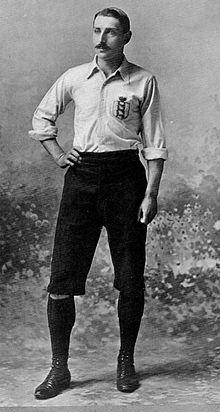- R. Cunliffe Gosling
-
Robert Cunliffe Gosling DL (15 June 1868 – 8 April 1922), was a Victorian-era footballer who played as a speedy inside forward for the renowned amateur clubs Old Etonians and the Corinthians. He captained the England team on one, possibly two, occasions (contemporary sources are inexact) and scored two goals.
Described by Sir Frederick Wall, the long-serving Secretary of the Football Association, as "the richest man who ever played football for England", Gosling was the scion of a wealthy Essex family and was educated at Eton and Trinity College, Cambridge.[1] The oldest of seven brothers (and one of 14 children), four of whom played cricket for Eton against Harrow, he was, recalled the early sportwriter JAH Catton ("Tityrus"), "the most aristocratic-looking man I ever saw", a view concurred in by his England international colleague C.B. Fry, who described him as "the best-looking man of my acquaintance" and one of the players whose presence in the Corinthians' side contributed to "their reputation up North as a team of toffs".
Gosling's bearing lent him an imposing presence on the football field. He looked, Wall recalled, "every inch the high-born... [his] carriage and gait would have done credit to a court Chamberlain at a levee", and was admirably built, being merely "bone and muscle, not soft flesh". His play, the F.A. man added,
- "was superb - all polish and perfection. He looked the gentleman he was, suave, kindly and never unfair. But let anybody tackle him and try to nudge him off the ball! After impact with his massive proportions, with the impetus of a fleet runner, the tackler knew what a charge meant. He would be inclined to shake himself like a dog, with the air of assuring himself that all his limbs were still attached and functioning."
Edward Grayson, the historian of the early amateur game, was another admirer of the England captain. "Well over six feet in height," he wrote,
- "and weighing nearly thirteen stone, he left his mark both at inside-right and inside-left, with his speed, passing and shooting from all angles that underlined the dribbling skill he had acquired from Eton's Field Game. His unselfishness and finesse no doubt gave him the wonderful knack of knowing how to keep his line together, a quality which England's selectors have unhappily found wanting in nearly all the inside-forwards with whom they have experimented since the Second World War. Gosling's play... was the very refinement of football, and effective football, too. Had any other club than Old Etonians claimed his service... he would have been exalted at football in the manner reserved by cricket idolaters for Lionel Palairet, Reggie Spooner and Victor Trumper."
Gosling was, moreover, invariably sportsmanlike in his approach to the game, and entirely lacked malice. It was this quality that led "Nudger" Needham, the Sheffield United and England professional, to describe him as "a heavy, but a gentle player".
Having played football for Cambridge against Oxford in the Varsity Match of 1890, Gosling was awarded a total of five England caps between 1892 and 1895, and showed himself - according to his contemporary G.O. Smith - one of the outstanding international forwards of the day: a shade less talented than Steve Bloomer, perhaps, but far less inclined to keep the ball, and so easier to play with.
Gosling also played first-class cricket for Cambridge and Essex between 1888 and 1896.
After his retirement from sport, Cunliffe Gosling served as a Justice of the Peace in his home county, Essex, and in 1902 was appointed as High Sheriff of Essex. He died in his bed, recorded Catton, leaving a fortune proved at over £700,000 (£21,260,000 at current prices).
Sporting positions Preceded by
Charles Wreford-BrownEngland football captain
1895Succeeded by
G.O. SmithHonorary titles Preceded by
Ernest James WythesHigh Sheriff of Essex
1902-1903Succeeded by
Richard Percival DavisReferences
- ^ R. Cunliffe Gosling in Venn, J. & J. A., Alumni Cantabrigienses, Cambridge University Press, 10 vols, 1922–1958.
- Catton, J.A.H. ("Tityrus") (2006 reprint of 1926 original). The Story of Association Football. Cleethorpes: Soccer Books. ISBN 1-86223-119-2.
- Grayson, Edward (1996 edition of 1955 original). Corinthians and Cricketers and Towards a New Sporting Era. Harefield, Middlesex: Yore Publications. ISBN 1-874427-71-2
- Needham, Ernest (2003 reprint of 1901 original). Association Football. Cleethorpes: Soccer Books. ISBN 1-86223-083-8
- Wall, Sir Frederick (2006). 50 Years of Football 1884-1934. Cleethorpes: Soccer Books.
External links
- England Captains - Cunliffe Gosling at www.englandfootballonline.com Gosling's England captain profile
- England's Captains by Match 1872-1914 at www.englandfootballonline.com England captains 1872-1914
- Cricinfo - Players and Officials - Robert Gosling at content-usa.cricinfo.com Gosling's first-class cricket record
Categories:- 1868 births
- 1922 deaths
- Pre-1914 association football players
- Deputy Lieutenants of Essex
- England international footballers
- English footballers
- Old Etonians F.C. players
- Cambridge University A.F.C. players
- Corinthian F.C. players
- English cricketers
- Old Etonians
- High Sheriffs of Essex
- Alumni of Trinity College, Cambridge
Wikimedia Foundation. 2010.

